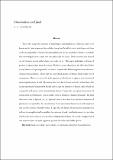Files in this item
Universalism and junk
Item metadata
| dc.contributor.author | Cotnoir, A.J. | |
| dc.date.accessioned | 2015-12-12T00:11:50Z | |
| dc.date.available | 2015-12-12T00:11:50Z | |
| dc.date.issued | 2014 | |
| dc.identifier | 158988845 | |
| dc.identifier | d68b1938-a555-4b89-81ef-eb5ec36e1a1d | |
| dc.identifier | 84911401035 | |
| dc.identifier | 000344398100003 | |
| dc.identifier.citation | Cotnoir , A J 2014 , ' Universalism and junk ' , Australasian Journal of Philosophy , vol. 92 , no. 4 , pp. 649-664 . https://doi.org/10.1080/00048402.2014.924540 | en |
| dc.identifier.issn | 0004-8402 | |
| dc.identifier.other | ORCID: /0000-0003-4528-7570/work/65702596 | |
| dc.identifier.uri | https://hdl.handle.net/10023/7909 | |
| dc.description.abstract | Those who accept the necessity of mereological universalism face what has come to be known as the junk argument due to Bohn [2009], which proceeds from (i) the incompatibility of junk with universalism and (ii) the possibility of junk, to conclude that mereological universalism isn't metaphysically necessary. Most attention has focused on (ii); however, recent authors have cast doubt on (i). This paper undertakes a defence of premise (i) against three main objections. The first is a new objection to the effect that Bohn's defence of that premise presupposes far too much. I show that one can defend premise (i) from a much weaker set of assumptions. The second objection, due to Contessa [2012], is that those who accept unrestricted composition should only accept the existence of binary sums (which are compatible with junk) rather than infinitary fusions. I argue that this conception of unrestricted composition is problematic: it is in conflict with an intuitive remainder principle. The final objection is due to Spencer [2012]. His view is that there is no absolutely unrestricted plural universal quantifier; so any statement of the unrestricted fusion axiom will simply not rule out the existence of junky worlds. I argue that the failure of unrestricted quantification will not be enough by itself to establish the existence of junk. Furthermore, it is not clear whether this view counts as a form of mereological universalism. As a result, I suggest that if one wants to reject the junk argument, premise (ii) is the only viable option. | |
| dc.format.extent | 16 | |
| dc.format.extent | 121293 | |
| dc.language.iso | eng | |
| dc.relation.ispartof | Australasian Journal of Philosophy | en |
| dc.subject | Junk | en |
| dc.subject | Mereology | en |
| dc.subject | Universalism | en |
| dc.subject | Extensionality | en |
| dc.subject | Unrestricted quantification | en |
| dc.subject | B Philosophy (General) | en |
| dc.subject | BC Logic | en |
| dc.subject.lcc | B1 | en |
| dc.subject.lcc | BC | en |
| dc.title | Universalism and junk | en |
| dc.type | Journal article | en |
| dc.contributor.institution | University of St Andrews. University of St Andrews | en |
| dc.contributor.institution | University of St Andrews. Philosophy | en |
| dc.identifier.doi | 10.1080/00048402.2014.924540 | |
| dc.description.status | Peer reviewed | en |
| dc.date.embargoedUntil | 2015-12-12 |
This item appears in the following Collection(s)
Items in the St Andrews Research Repository are protected by copyright, with all rights reserved, unless otherwise indicated.

